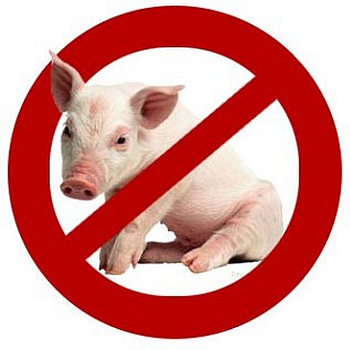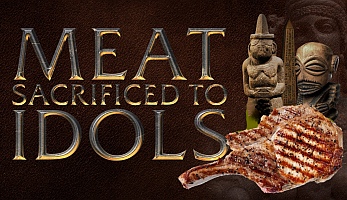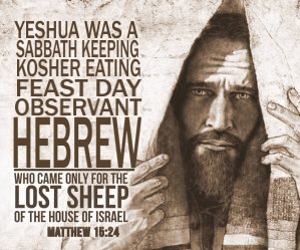
|
| ...clean vs. idolatrous food |
Part One: Clean or Unclean
by haRold Smith
a citizen of the Commonwealth
(Ephesians 2:19)
"...because it does not go into his heart, but into his stomach, and is eliminated? (Thus He declared all foods clean)." Mark 7:19
"Who sit among graves and spend the night in secret places; who eat swine's flesh, and the broth of unclean meat is in their pots." Isaiah 65:4
My first encounter with the concept of elevation of Spirit (click on highlighted words to view scripture) came after my first heart attack when the Father instructed me not to eat any more pork. At the time, I only had a vague knowledge of the dietary instructions - considering them (like every other good, believing "Christian") to be "under the law" that I was now exempt from. I did not go to a doctor or hospital over this episode and only found out later from a doctor friend that when people are admitted to the hospital for heart problems, the first thing they are taken off of is pork. He said it is the worst substance in the world you can put into the human body. At the same time YHVH told me not to eat pork He also said to stay away from eating fried chicken and I love southern fried chicken (that should tell you something about fried chicken). It was not until I got to Israel that I found out that, in Middle Eastern cultures, pork is not considered a food. In researching scripture, I found there are creatures that the Father has put in place to clean up the planet - they are called scavengers and are found throughout creation. They are there for a purpose but were never designed for absorption into the human body. I seriously doubt that if someone placed before you a nicely prepared, roasted vulture that would you eat it. That is the same genus as is pork, shellfish, fish without scales and a host of other creatures on the planet listed in the Tanakh (OT). But, this information seems to fly in the face of Yeshua's words of Mark 7:19 above. What a mess this verse has created! Why it became a mess is a study in the program of self-identity that the Church undertook in the third century. Suffice it to say that the early fathers of the Church made deliberate attempts to remove themselves from Hebraic origins and dietary laws were front and center in that effort. But third century exegesis does not make good first century commentary. There is more here than meets the eye - especially if you are wearing "Christian-dogma" colored glasses. There are problems with the Greek text and the misinterpretation of this text based on the addition of "Thus He declared." No such subject occurs in the Greek, making the dangling participle (cleansed) awkward. A perfectly legitimate translation of the text would focus on the bodily cleansing process of elimination, contrasting this process with the defilement of the heart which is not cleansed through normal elimination.
Daniel Boyarin in The Jewish Gospels, p. 113, provides an even clearer solution to this difficult passage by treating it for what it is in context. Yeshua is engaged in an intramural debate with other Pharisees over the precise requirements of the purification of food. Boyarin points out that in the first century some Pharisees advocated strict observance of the oral Torah which added stipulations about handling kosher food so that it might not be contaminated by contact with unclean substances. As Boyarin notes, the debate is not about the necessity of kashrut (kosher eating), observing that the dialog never challenges the need for dietary laws. The dialogue challenges the Pharisee's added requirements about handling food (and in Torah, anything not kosher is not food). Boyarin indicates that "the system of purity and impurity laws and the system of dietary laws are two different systems within the Torah's rules for eating." Yeshua is addressing the former, not the latter. Yeshua simply says that the Pharisees additional requirements concerning hand washing are unnecessary since no impurity is attached to what YHVH has already designated as "food" simply because a man doesn't wash his hands before touching it. Such supposed impurity cannot defile a man because it passes through him. Yeshua recalls the emphasis of the written Torah, noting that only what comes out of a man can defile him. And Torah is quite specific on what those things are (menstrual blood and semen). These things, and only these things, that come out of the body can render someone ceremonially unclean. Food cannot do so. Thus, concludes Yeshua, the additional requirement of hand-washing is not only superfluous - it is not found in Torah. Then Yeshua makes an object lesson of this event. He explains to his disciples that the added requirements of the Pharisees have missed the point. What matters when it comes to purity is the condition of the heart. This is not a statement about kashrut. Kosher still applies. No one in the circle of this conversation ever doubted that. When Mark adds the editorial, "cleansing all foods," he was not abrogating kashrut. He was explaining that food touched by impure substances does not render the consumer impure. Any food (and that means kosher) is already cleansed because YHVH has already designated it food. Boyarin puts to rest the tortured exegesis of Christian apologists who wish to claim Yeshua abolished kashrut. Everyone present on that day was Hebrew. Everyone was Torah observant when it came to kashrut. Yeshua never suggested otherwise. He simply took issue with the Pharisaical practice of hand-washing as a useless addition. If Boyarin, a Hebrew scholar, can see that this is the heart of Yeshua's comment, then why do Christian theologians insist on adding "Thus He declared," as Origen did in the second century? Could it be that they want to be rid of kashrut even if Yeshua doesn't say so? It seems they are using the same tactics as the Pharisees to advance their own agenda.
|
"But I have a few things against you, because you have there some who hold the teaching of Balaam, who kept teaching Balak to put a stumbling block before the children of Israel,
to eat things sacrificed to idols and to commit sexual fornication." Revelation 2:14 |

|
By the way, these are two of the same subjects we find in the debate over the status of the Gentiles in Acts 15. If we are going to be faithful to the text, we will have to admit that somehow, some way, kosher dietary regulations still seem to apply here. And that raises enormous questions about the common "Christian" assumption that the Torah and its kosher requirements were abolished after the Resurrection. So who's mistaken? Is John confused? Did the visionary Messiah really say something else? Or are we in error? Have we made assumptions about what YHVH does not demand of us that are not supported by His Word? It's a problem. It's especially a problem since this is the last of the Messianic (NT) books and a clear declaration of the risen and triumphant Lord. It's an especially difficult problem when it is accompanied by a threat. Do we really want the risen Messiah to "make war" against us? Most Christians have great difficulty accepting the fact that Torah applies to them. I did not say, of course, that Torah saves them. I just said that it applies to them. For whatever reason, most of the resistance comes with food. We are perfectly agreeable to have our doctors tell us what to eat and what not to eat. We spend fortunes on books to help us eat properly. But when YHVH says, "Don't eat this," we bristle and fight. Why is that? As far as I can tell, it must have something to do with our basic need to assert our freedom to do what we want. But if we can't bend our will to such a simple thing as eating according to YHVH's requests, what does this imply about other behaviors YHVH might desire that we so cavalierly brush aside? And what does this have to say about the rest of the letter of Revelation written to John's Hebrew brethren - not the world at large?
So, why did YHVH lump the instructions regarding food, sexuality and idolatrous worship all together, in Leviticus 11 through 21, and why does He again mention unclean food with idolatry in Isaiah 65 and 66? What is the connection? It cannot be accidental. This seems to be a clear-cut case of kal v'khomer (Hebrew for "light and heavy") where YHVH begins with the "lighter" or simpler matter of discernment between holy and profane, clean and unclean - namely, food - and progresses to sexuality and, finally, idolatrous worship. We know, as already mentioned, that YHVH instructed Moses about food, sexuality and idolatry all together as one "package" of instructions. We know that YHVH mentions idolatrous worship and the consumption of unclean food together in Isaiah 65:4 above and Isaiah 66:17. And for those of you who would say, "I don't eat meat sacrificed to idols!", my friend Robert pointed out a discovery he made about Oriental food. It seems that every Oriental restaurant behind the scenes offers the food they cook every day to their oriental god. Plus, they season that food with oyster sauce to give it the distinctive flavor and aroma that is so appealing to so many - but it's not kosher.
Like the Sabbath, though, these instructions on separation did not begin with Moses at Sinai. The clean and unclean instructions are specifically mentioned early in the account of the Noachian Flood, when Noah was commanded to take "seven each of every clean animal". So we know that Noah knew the difference between clean and unclean beasts BEFORE he and his family went onto the ark (Genesis 7:1-2). That means, he and his sons knew what animals were acceptable as offerings to YHVH and what were not (Genesis 8:20). We are shown that after the flood Noah and his sons, knowing the difference between clean and unclean beasts, were given permission to eat of the clean beasts - those that were acceptable as offerings. This means that neither Ham, Shem nor Japheth ate pig or any other unclean food. Genesis 9:3 contains a command that has proven difficult for some to understand: YHVH says to Noah, "Every moving thing that lives shall be food for you. I have given you all things, even as the green herbs." Some take this to mean that YHVH has changed direction to give carte blanche authority to eat any kind of animal. But is this really what is being said? The key to this verse is "even as the green herbs." In other words, YHVH gave Noah the authority to eat flesh within the same parameters as He allowed to eat vegetation. Does that mean that YHVH allows the eating of plants like poison ivy, hemlock, deadly nightshade, etc.? Of course not! Just as certain plants are harmful to us, so are certain meats. Even though people throughout the world eat unclean food and live and even though we could probably do the same (as many of us once did) - it is not actually a health matter. YHVH never directly connects keeping the instructions of Leviticus 11 and Deuteronomy 14 with health - they are put there as instructions on how to obey YHVH. Continuing with the pre-Mosaic scriptural references to clean and unclean food, we are told that Shem died 35 years after Abraham (Jasher 28:24). This extra-biblical source records that Shem knew both Abraham and Isaac - they were contemporaries. It is why both Abraham and Isaac knew the difference between clean and unclean meats and of the instructions to Noah (passed on through Shem) that permission had been given to eat of the clean animals (but not of their blood). We know, as a fact, that YHVH did NOT change any of the instructions regarding idolatry or sexuality at all after Yeshua (Matthew 5:17-18). What the apostles taught on these matters agrees completely with Moses. Those who point to Peter's vision on the rooftop of Simeon's house as proof that YHVH dismissed the dietary instructions haven't read what Peter himself declares about the vision - it was about people, not food.
| "You shall therefore keep all my statutes and all my rules and do them, that the land where I am bringing you to live may not vomit you out. And you shall not walk in the customs of the nation that I am driving out before you, for they did all these things, and therefore I detested them... I am YHVH who has separated you from the peoples. You shall therefore separate the clean beast from the unclean, and the unclean bird from the clean. You shall not make yourselves detestable by beast or by bird or by anything with which the ground crawls, which I have set apart for you to hold unclean." Leviticus 20:22-25 |

|
Part One - Clean or Unclean
Part Two - Peter's Vision
| "You shall be holy to me, for I, YHVH, am holy and have separated you from the peoples that you should be mine." Leviticus 20:26 |
Please feel free to email me at harold@hethathasanear.com. While not claiming to have all the answers, it would be an honor to partake with you of what the Spirit is uncovering.